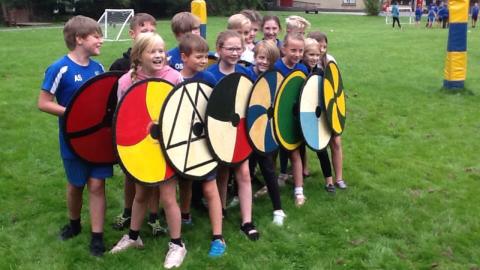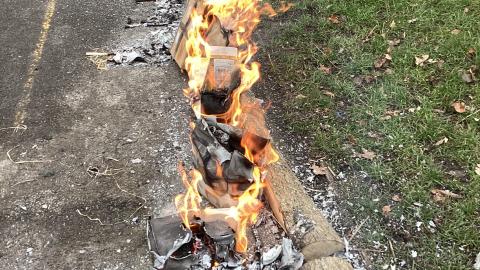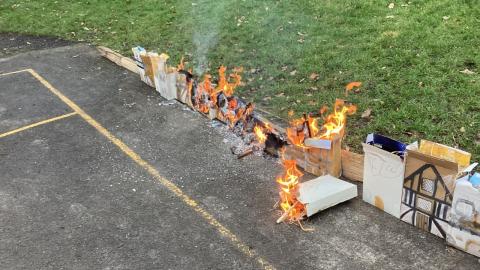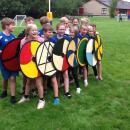Vision:
‘The more you know about the past, the better prepared you are for the future’ (Theodore Roosevelt)
We believe that history is essential to the past, present and future and without it we would not know much about our ancestors and how to deal with current problems. As history is all around us, it helps us to understand change and societal developments.
Intent:
At Settle CE Primary School, our subject leader is Mrs Hulse, who is also one of the teachers in Year 3. History is a valued part of our curriculum as it gives us a sense of identity. Our aim at Settle CE Primary School is to encourage pupils to develop an appreciation and understanding of the past in Britain and the wider world. History is about real people who lived in the past and real events which happened in the past. History is concerned with sequence, time and chronology. Our History curriculum has been designed to cover all of the skills, knowledge and understanding as set out in the National Curriculum The National Curriculum states that ‘a high-quality history education will help pupils gain a coherent knowledge and understanding of Britain’s past and that of the wider world. It should inspire pupils’ curiosity to know more about the past.’ In line with the National Curriculum 2014, we aim to ensure that all pupils: know and understand the history of these islands as a coherent, chronological narrative, from the earliest times to the present day: how people’s lives have shaped this nation and how Britain has influenced and been influenced by the wider world know and understand significant aspects of the history of the wider world: the nature of ancient civilisations; the expansion and dissolution of empires; characteristic features of past non-European societies; achievements and follies of mankind gain and deploy a historically grounded understanding of abstract terms such as ‘empire’, ‘civilisation’, ‘parliament’ and ‘peasantry’ understand historical concepts such as continuity and change, cause and consequence, similarity, difference and significance, and use them to make connections, draw contrasts, analyse trends, frame historically-valid questions and create their own structured accounts, including written narratives and analyses understand the methods of historical enquiry, including how evidence is used rigorously to make historical claims, and discern how and why contrasting arguments and interpretations of the past have been constructed gain historical perspective by placing their growing knowledge into different contexts, understanding the connections between local, regional, national and international history; between cultural, economic, military, political, religious and social history; and between short- and long-term timescales.
Implementation:
At Settle CE Primary School, our History curriculum aims to allow the children to develop their own skills as historians, to recall knowledge and to make connections. Our curriculum maintains a consistent knowledge base to ensure progression throughout the whole school. All learning will start by revisiting prior knowledge. To help children with their recall of knowledge in all units of work, teachers in Y1-6 will use: Flashbacks- 3/4/5 questions (depending on the year group) at the beginning of a lesson to check which knowledge has ‘stuck’ from the previous lesson. Knowledge Organisers- these are accessed by all pupils to support their current, past and future learning in the current unit of work. Key vocabulary and a timeline for the current unit of work is accessible for the children to check their understanding. Quizzes – these are used at the end of the unit of work, to help assess what the children have remembered from the current unit of work. A selection of questions from these quizzes will be used to assess what the children remember from previous year groups. History is taught in half termly units (alternating with Geography), which are informed by the National Curriculum. Each unit in our curriculum is underpinned by rich, substantive knowledge and ambitious vocabulary, whilst also ensuring the children are developing their disciplinary knowledge (historical skills). Through an enquiry-based approach, children are encouraged to ask and explore historically valid questions and share their findings. At the beginning of each new history unit, teachers refer to timelines to help develop children’s understanding of chronology. Each unit of work is introduced with reference to the chronology of previous units (including those from previous years). By the end of Year 6, children will have a chronological understanding of British history from the Stone Age to the present day. Interlinked with the study of British History are studies of World history, such as the Ancient civilisations of Greece and Egypt. The children are able to draw comparisons and make connections between different time periods. Children learn that British history was happening at the same time as World history. We have identified a set of key historical concepts or ‘golden threads’, that the children will repeatedly revisit throughout their time at Settle CE Primary School. These are: Empire, Invasion, Monarchy, Parliament, Settlement and Democracy.
Impact:
At Settle CE Primary School, we aim that children continuously build on their knowledge in History. We want every child to have a passion for history and an enthusiastic engagement in learning, which develop their sense of curiosity about the past and their understanding of how and why people interpret the past in different ways. Our History curriculum is designed to help our children develop a sound overview of the past, to analyse it with a critical mind and to remember more. We believe that if children have become knowledgeable historians, then they will be able to confidently talk about their understanding. As a result of strong teacher subject knowledge, by the end of Year 6, children will have developed a strong chronological understanding of British history from the Stone Age to the present day. They will have had opportunities to make comparisons with the achievements of the earliest civilizations, study the non European societies of The Maya, Ancient Egypt and the influence of Ancient Greece on the wider world. Children will have an understanding and perspective about our locality and some of the challenges and achievements that have shaped the local area in which we live. The work produced by the children shows how our enquiry-based approach gives real purpose and focus to each unit of work. Each lesson is planned carefully to address the over-arching enquiry question. Children will be able to make links and comparisons to previously studied units of work. The History subject leader and the Senior Leadership Team will undertake monitoring and evaluation, in the form of learning walks, book looks and pupil/ teacher voices. Outcomes in books will evidence a broad and balanced history curriculum and demonstrate the children’s acquisition of identified key knowledge.




